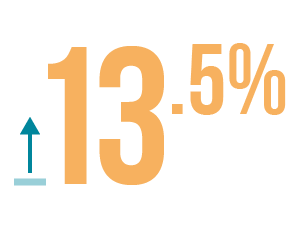- Home
- Knowledge
- Resource library
- Freelancer Confidence Index Q1 2022
Freelancer Confidence Index Q1 2022
- Research
- 27 Jun 2022
- Joshua Toovey
-
Freelancers’ confidence in their own businesses for the next three months has risen from -11.0 in Q4 2021 to 2.2 this quarter.
-
Freelancers expect their day rates to increase by an average of 13.5 per cent over the next 12 months.
-
Freelancers’ confidence in the UK economy for the next three months has increased only slightly from -23.7 in Q4 2021 to -23.1 this quarter.
Despite record levels of inflation and rumours of a global economic recession, freelancers’ confidence in their own businesses, in the next three months, has risen from -11.0 in Q4 2021 to 2.2 this quarter. For context, the growth in confidence represents a return to positive figures for the first time since Q2 2021.
In Q1 2022, the index found that freelancers expect their day rates to increase by an average of 13.5 per cent over the next 12 months. This represents a significant increase from Q4 2021, where self-employed workers anticipated an increase of just 3.6 per cent.
Moreover, as the country moves further away from the pandemic, the index finds that freelancers are increasingly confident about their business. Freelancers’ spare capacity has increased to 3.2 weeks without work per year, job-related stress has fallen to its lowest levels since Q3 2019 at 5.84 (on a 10-point scale where zero is not at all stressed and 10 is extremely stressed), and job satisfaction has grown to 5.81 (on a 10-point scale where zero is not at all satisfied and 10 is extremely satisfied).
Negativity towards the economy
The index, however, finds that freelancers’ confidence in the economy as a whole still remains low. It found that freelancers’ confidence in the UK economy for the next three months has increased only slightly from -23.7 in Q4 2021 to -23.1 this quarter.
In Q1, the most detrimental factor (64.7%) on freelancers’ business performance was the state of the UK economy. This can be largely attributed to the cost of living crisis engulfing the UK as a result of rising inflation, the war in Ukraine, Brexit and rising energy and goods prices combining to heighten fears of an economic recession.
The other main factors impacting freelancers last quarter were government tax policy (62.1%) and regulations relating to hiring freelancers (59.2%).
Day rates and quarterly pay
After two successive quarters of day rates rising to record levels in Q3 2021 and Q4 2021, freelancer day rates have now fallen for the first time since Q2 2021, with the average amount charge by freelancers over the last three months decreasing from £584 in Q4 2021 to £516 this quarter.
Moreover, quarterly pay has also dropped too. The index found that the average amount charge by freelancers over the last three months has decreased from £584 in Q4 2021 to £516 this quarter.
In addition, freelancers expect their day rates to increase by an average of 13.5 per cent over the next 12 months.

Rising Debt and costs
Concerningly, with worries over the economy rising, the report found that the majority of freelancers (86%) now expect their input costs to increase over the next 12 months – rising from 81 per cent in Q4 2021.
It also found that almost two-fifths of freelancers (39%) are now incurring business debt (slightly up from 38% in Q4 2021), with 16 per cent incurring debt via credit cards issued in the name of their self-employed business.
Read the full report here
Meet the author

Joshua Toovey
Senior Research and Policy Officer
